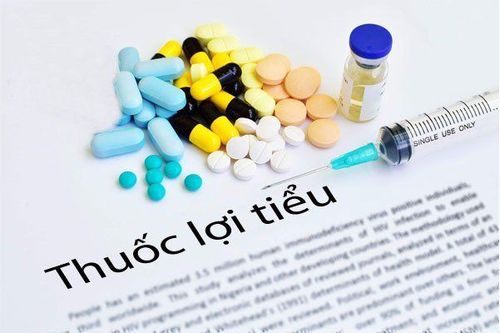This is an automatically translated article.
Hypertension is a very common disease and is showing signs of aging. A side effect that worries many patients, especially men, is that the antihypertensive drug causes impotence. So what are the antihypertensive drugs causing impotence and the principle of using antihypertensive drugs for impotence?
1. Do antihypertensive drugs cause impotence?
Impotence is a condition in which the penis is not erect or not erect enough to perform sexual intercourse. This is a sexual dysfunction that greatly affects the quality of life and confidence of men.
There are many causes of impotence, including psychological stress, some metabolic diseases, frequent and prolonged use of stimulants, and side effects of some drugs. treatment,...
Among the side effects that cause impotence of drugs, it is impossible not to mention the group of drugs that treat blood pressure p . Some groups of antihypertensive drugs commonly reported to cause impotence are older generation beta-blockers (Atenolol, Propanolol), diuretics (hydrochlorothiazide), etc. Some diuretics cause decreased blood flow to the penis. It also reduces zinc levels in the body. While zinc is a necessary ingredient for the production of testosterone, an important male sex hormone. Therefore, long-term use of diuretics can cause impotence.
When using drugs to treat high blood pressure, which is considered rare, there is a risk of erectile dysfunction, but there are still patients with erectile dysfunction. As mentioned above, there are many causes of impotence and high blood pressure itself can cause impotence. High blood pressure for a long time will damage the lining of blood vessels, causing blood vessels to become atherosclerotic, narrow, and reduce blood flow. Decreased blood flow to the penis makes it difficult for the penis to achieve an erection. Besides, high blood pressure also reduces sex drive and affects the process of ejaculation.
Thus, for a case of a man using antihypertensive drugs causing impotence, the patient needs to see a doctor to assess the overall risk factors. Impotence is caused by a side effect of blood pressure medication, by long-term uncontrolled blood pressure, or by other factors. Depending on the specific condition of the patient, the doctor will make appropriate adjustments.
2. Principles of using drugs to treat high blood pressure and impotence
Priority should be given to the management of hypertension in patients with untreated, poorly controlled, rapidly increasing malignant hypertension. Accordingly, sexual activities should be postponed until blood pressure stabilizes. Use of diuretics and beta-blockers to treat high blood pressure after failure to correct lifestyle changes. Changing medications is less likely to cause erection problems when impotence persists or blood pressure rises again. Combinations of drugs may work better to control high blood pressure and reduce the risk of impotence. In some cases, doctors may still prefer medications to treat high blood pressure that are less likely to cause impotence problems. Therefore, ask your doctor for specific advice about the type of drug, the strength.
3. High blood pressure drugs are unlikely to cause impotence
Diuretics (such as hydrochlorothiazide) and beta-blockers (such as Atenolol) can cause erection problems. Meanwhile, there are also several families of high blood pressure drugs that rarely cause impotence, for example:
ACE inhibitors Alpha blockers Calcium channel blockers ARBs - Angiotensin receptor blockers 3.1 Enzyme inhibitors ACE inhibitors, in addition to reducing angiotensin II production, also decrease the degradation of bradykinin, triggering nitric oxide release and leading to cavernous relaxation.
ACE inhibitors widen blood vessels and increase blood flow. Therefore, impotence side effects are very rare, occurring in less than 1% of patients.
3.2 ARBs Drugs called ARBs (angiotensin II receptor blockers like Losartan) are not only unlikely to cause erection problems, but they may also improve sexual function in men with hemophilia. high pressure.
One study found that drugs control blood pressure equally well. However, ARB users reported having sex more often during the 16 weeks of treatment. They said they had sex about eight times a month before and 10 times a month after. People taking beta-blockers had less sex: eight times a month before and four times a month after.
3.3 Calcium channel blockers and impotence Drugs called calcium channel blockers, such as Amlodipine, Diltiazem, or Verapamil rarely cause impotence. But erection problems may be less common with some individual drugs in that class than with others. You can ask your doctor for more information about these impotence medications.
3.4 Alpha Blockers Alpha blockers generally don't cause erection problems. In one study, a small number of men actually experienced a 100% improvement in their impotence after 2 years of taking an alpha Cardura inhibitor.
4. What to do when antihypertensive drugs cause impotence?
Tell your doctor if you think blood pressure medication may be the cause of your erection problems. If the cause is medication, then switching to a different prescription may solve the problem. Therefore, you must not stop taking the medicine without your doctor's consent. Besides, it should also be noted that high blood pressure can still be the cause of impotence. In that case, ask your doctor about trying an impotence medication like Cialis, Levitra, Stendra, Staxyn, or Viagra.
Patients should only take these drugs when high blood pressure is under control. They are not safe for men with untreated high blood pressure. They are also not safe for men taking alpha blockers or men taking nitrates for heart disease.
Follow Vinmec International General Hospital website to get more health, nutrition and beauty information to protect the health of yourself and your loved ones in your family.
Please dial HOTLINE for more information or register for an appointment HERE. Download MyVinmec app to make appointments faster and to manage your bookings easily.













